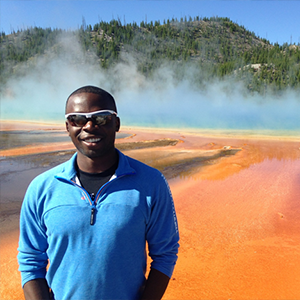
Moyo Ajayi
PhD Candidate, Vanderbilt University
Becoming a geoscientist has made me even more passionate about the global environment.
When did you first decide that you wanted to pursue a career in geoscience?
I decided to become a geoscientist during the spring semester of my sophomore year in college upon the advice of my academic advisor. Her suggestion was based upon my interest in sciences, particularly the way people apply sciences to tangible problems, as well as my interest in working outside. My interest in geosciences was sealed after taking a course entitled, Renewable Energy during my junior year, which showed me how geosciences can be applied to responsibly supplying energy for the growing global population.
What do you do at your job day to day?
As PhD student who has completed all coursework, my daily work regimen varies but can be generally reduced to: reading, teaching, writing, and coding. I read to keep on top of the literature in my field and to find how my research fits into and adds to my discipline. Every other semester I am required to be Teacher’s Assistant and therefore I get to lead discussion and laboratory sections as well as grade and evaluate my students. Writing is another important part of my daily obligations; putting my research into a publishable document or soliciting organizations for funding new research is an ongoing cycle. Lastly, coding is a large part or my work. I acquire a large amount of data every time I am out in the field and thus I need to automate the analysis and visualization processes as much as possible so I spend time writing algorithms to do so.
What is your favorite part about your job?
Two things: programming a useful algorithm and traveling. Not many things are more satisfying than generating a useful script that saves you time and leverages your data to produce insight on the research. Travel almost goes without saying; by being a geoscientist, I have been able to research from the tundra of Alaska to the geysers of Yellowstone National Park, and even Paris, France to share my results at a conference.
What about your job do you find most challenging?
The writing part of my job is the most challenging. Writing scientific research is, in my opinion, far more difficult than writing an essay for a humanities course. Though, the length of the science paper may be less than an essay for a humanities course, I find the process of presenting a theory and providing a convincing argument through graphics and text challenging. However, seeing your name in a published peer-reviewed journal is very rewarding (especially if it gets cited by another researcher).
If you could go back and give your college self one piece of professional advice, what would it be?
I believe I was very fortunate in college to get a lot of good advice from mentors and instructors before and while I was in college. But if there was one thing that I would advise my college self, it would be, if you are a STEM major, take as much math and programming as you can manage. In this interdisciplinary world, those two disciplines are used and being very strong in those areas coming out of college will make you an even better scientist, engineer, and/or mathematician. Also, always practice on becoming a better writer; writing and effective communication is needed in any field.
Has being a geoscientist changed the way you view the world around you, and if so, how?
Becoming a geoscientist has made me even more passionate about the global environment. I have always been an avid user of parks but now as a geoscientist I am more acutely aware of the landforms that I walk on and within the world of human concerns, studying greenhouse gases has altered the way I travel and consume goods because I want to reduce my greenhouse emission footprint. Most of all, becoming a geoscientist has changed the way I vote because I want to support legislators and legislature that will provide sustainable health for the planet.